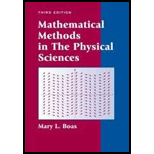
Table entries L28 and L29 are known as translation or shifting theorems. Do Problems 19 to 27 about them.
Sketch on the same axes graphs of
Want to see the full answer?
Check out a sample textbook solution
Chapter 8 Solutions
Mathematical Methods in the Physical Sciences
Additional Math Textbook Solutions
Thinking Mathematically (6th Edition)
Elementary and Intermediate Algebra: Concepts and Applications (7th Edition)
Calculus for Business, Economics, Life Sciences, and Social Sciences (14th Edition)
University Calculus: Early Transcendentals (4th Edition)
Elementary Statistics
Elementary Statistics (13th Edition)
- Question 5. Let A, B, C ben x n-matrices, S is nonsigular. If A = S-1 BS, show that det (A) = det (B) Question 6. For what values of k is the matrix A = (2- k -1 -1 2) singular? karrow_forward20.07 52% X https://www.chegg.com/hc <: C Chegg Learn on the go = Chegg (X) Open in app EN-US ✔ What's your next question? √x #16 A surveyor sees a building across the river. Standing at point A he measures the angle of elevation from the ground to the top of the building to be 30 degrees. He steps back 100 feet and again measures the angle of elevation and finds it to be 15. (See Figure 12.26.) Assuming that it makes a 90-degree angle with the floor, approximately how tall is the building? 15 30° 100 A river Figure 12.26 Show image transcript Here's the best way to solve it. Solution ||| о building < Sharearrow_forward1 4 5 Question 3. Find A-1 (if exists), where A = -3 -1 -2 2 3 4 Question 4. State 4 equivalent conditions for a matrix A to be nonsingulararrow_forward
- No chatgpt pls will upvotearrow_forwardModule Code: MATH380202 3. (a) Let {} be a white noise process with variance σ2. Define an ARMA(p,q) process {X} in terms of {+} and state (without proof) conditions for {X} to be (i) weakly stationary and (ii) invertible. Define what is meant by an ARIMA (p, d, q) process. Let {Y} be such an ARIMA(p, d, q) process and show how it can also be represented as an ARMA process, giving the AR and MA orders of this representation. (b) The following tables show the first nine sample autocorrelations and partial auto- correlations of X and Y₁ = VX+ for a series of n = 1095 observations. (Notice that the notation in this part has no relationship with the notation in part (a) of this question.) Identify a model for this time series and obtain preliminary estimates for the pa- rameters of your model. X₁ = 15.51, s² = 317.43. k 1 2 3 4 5 6 7 Pk 0.981 0.974 0.968 akk 0.981 0.327 8 9 0.927 0.963 0.957 0.951 0.943 0.935 0.121 0.104 0.000 0.014 -0.067 -0.068 -0.012 Y₁ = VX : y = 0.03, s² = 11.48. k 1…arrow_forwardLet G be a graph with n ≥ 2 vertices x1, x2, . . . , xn, and let A be the adjacency matrixof G. Prove that if G is connected, then every entry in the matrix A^n−1 + A^nis positive.arrow_forward
- Module Code: MATH380202 1. (a) Define the terms "strongly stationary" and "weakly stationary". Let {X} be a stochastic process defined for all t € Z. Assuming that {X+} is weakly stationary, define the autocorrelation function (acf) Pk, for lag k. What conditions must a process {X+) satisfy for it to be white noise? (b) Let N(0, 1) for t€ Z, with the {+} being mutually independent. Which of the following processes {X+} are weakly stationary for t> 0? Briefly justify your answers. i. Xt for all > 0. ii. Xo~N(0,) and X₁ = 2X+-1+ &t for t > 0. (c) Provide an expression for estimating the autocovariance function for a sample X1,..., X believed to be from a weakly stationary process. How is the autocor- relation function Pk then estimated, and a correlogram (or acf plot) constructed? (d) Consider the weakly stationary stochastic process ✗+ = + + +-1+ +-2 where {E} is a white noise process with variance 1. Compute the population autocorre- lation function Pk for all k = 0, 1, ....arrow_forwardiii) i=5 x² = Σ i=1 (Yi — mi)² σ 2 By minimising oc², derive the formulae for the best values of the model for a 1 degree polynomial (2 parameters).arrow_forwardиз Review the deck below and determine its total square footage (add its deck and backsplash square footage together to get the result). Type your answer in the entry box and click Submit. 126 1/2" 5" backsplash A 158" CL 79" B 26" Type your answer here.arrow_forward
- Refer to page 311 for a sequence of functions defined on a given interval. Instructions: • Analyze whether the sequence converges pointwise and/or uniformly on the given interval. • Discuss the implications of uniform convergence for integration and differentiation of the sequence. • Provide counterexamples if any condition fails. Link: [https://drive.google.com/file/d/1wKSrun-GlxirS3IZ9qo Hazb9tC440 AZF/view?usp=sharing]arrow_forwardRefer to page 310 for a matrix and its associated system of differential equations. Instructions: • Find the eigenvalues of the given matrix and classify the stability of the system (e.g., stable, • unstable, saddle point). Discuss the geometric interpretation of eigenvalues in the context of system behavior. • Provide conditions under which the system exhibits periodic solutions. Link: [https://drive.google.com/file/d/1wKSrun-GlxirS3IZ9qoHazb9tC440 AZF/view?usp=sharing]arrow_forwardRefer to page 313 for a nonlinear differential equation and its linear approximation. Instructions: • Linearize the given nonlinear system around the equilibrium points. • Analyze the stability of each equilibrium using the Jacobian matrix and its eigenvalues. • Discuss the limitations of linearization for determining global behavior. Link: [https://drive.google.com/file/d/1wKSrun-GlxirS3IZ9qoHazb9tC440 AZF/view?usp=sharing]arrow_forward
- Algebra & Trigonometry with Analytic GeometryAlgebraISBN:9781133382119Author:SwokowskiPublisher:Cengage
 Trigonometry (MindTap Course List)TrigonometryISBN:9781337278461Author:Ron LarsonPublisher:Cengage Learning
Trigonometry (MindTap Course List)TrigonometryISBN:9781337278461Author:Ron LarsonPublisher:Cengage Learning Trigonometry (MindTap Course List)TrigonometryISBN:9781305652224Author:Charles P. McKeague, Mark D. TurnerPublisher:Cengage Learning
Trigonometry (MindTap Course List)TrigonometryISBN:9781305652224Author:Charles P. McKeague, Mark D. TurnerPublisher:Cengage Learning  Mathematics For Machine TechnologyAdvanced MathISBN:9781337798310Author:Peterson, John.Publisher:Cengage Learning,
Mathematics For Machine TechnologyAdvanced MathISBN:9781337798310Author:Peterson, John.Publisher:Cengage Learning,



